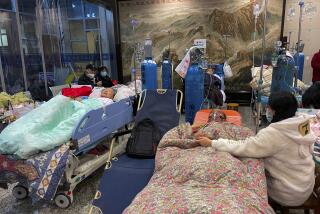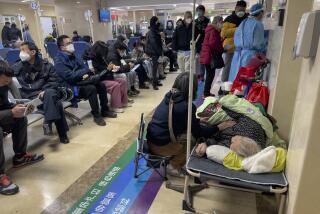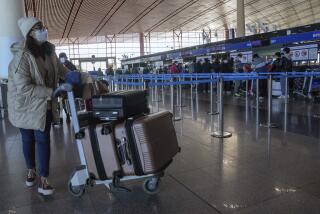Asia Bands Together on SARS
- Share via
BANGKOK, Thailand — Chinese Premier Wen Jiabao and the leaders of 10 Southeast Asian nations pledged closer cooperation Tuesday in the fight to contain the SARS virus as a leading World Health Organization official declared that public fears about the disease had become excessive.
A declaration released at the end of the leaders’ one-day summit here included initiatives for improved exchanges of information, joint research projects and coordinated immigration and customs controls. The declaration and the comments by WHO’s chief of communicable diseases, David Heymann, appeared aimed at easing the sense of panic that has gripped East Asia as the pneumonia-like illness has spread.
Also Tuesday, the WHO rescinded a warning it issued a week ago against nonessential travel to Toronto, where SARS arrived from Hong Kong in late February and has killed 21 people. However, in Asia, there was a raft of disturbing news about the spread of the disease, including 152 confirmed new cases reported in Beijing -- one of the largest single-day totals so far -- and South Korea’s first presumed case.
The Korean victim, a man in his 40s, had just returned from two months of language training in Beijing, according to health officials in Seoul.
Meanwhile, Hong Kong authorities were forced to dispatch a charter aircraft to Taiwan to bring a group of 33 tourists back home two days after they all had been placed in quarantine because a 6-year-old girl traveling with the group had developed a fever.
Unlike influenza viruses that originated in East Asia and went on to kill tens of thousands of people worldwide, the SARS virus has so far proved far less easy to transmit.
It has infected only about 5,000 people globally since it was first discovered in southern China in November. Still, public concern about the disease and a desire to avoid any contact with infected areas have had a devastating effect on the economies of individual areas and the region as a whole.
The disease, whose initials stand for severe acute respiratory syndrome, has so far killed about 350 people.
“Although SARS is certainly deadly under certain conditions, the fear of SARS is worse than the disease itself,” Thai Prime Minister Thaksin Shinawatra told a news conference after the Bangkok summit. He described the measures agreed to by the leaders of China and the 10-member Assn. of Southeast Asian Nations, or ASEAN, as “a strong commitment to cooperation ... to restore confidence in East Asia as an important tourism and business destination.”
The World Bank recently estimated that SARS would probably cost the region about $15 billion in lost economic growth this year, while other studies have predicted greater losses.
Only hours before the leaders met the media, Heymann talked to reporters about what he called “a discrepancy between the real risks of contracting SARS and the perceived risks as seen by the general public.” He described the virus as one spread only through close personal contact with someone who has the disease.
“The perception of the public is that this is a disease you can get by walking down the street, and this is not so,” Heymann said.
He added that he had personally not worn a surgical mask since arriving in Asia and described recommendations to wear a mask on the street as “not useful, because that’s not the way it’s transmitted.”
Protective masks have been widely worn in Hong Kong since the SARS outbreak began there last month and were briefly declared mandatory in Thailand for anyone returning from a SARS-infected area.
Heymann also noted that Beijing’s decision over the weekend to close movie theaters and restaurants in the city was not a step recommended by WHO.
“As they get more information, they will be making alterations to their response,” he said.
Wen, making his first foreign trip since he took over as China’s premier in mid-March, said there had been no attempt by ASEAN leaders to force an apology from Beijing because of its initial attempts to cover up the extent of the country’s SARS problems -- a move that allowed the virus to spread unchecked for weeks. But he admitted there had been major shortcomings on the part of the government.
“Regarding our countermeasures, certain departments did not do enough [and] we’ve already learned our lesson,” he said. “We understand the need for decisive measures.”
Wen said there is a major effort underway in China to prevent the spread of SARS into rural areas. “I believe we will gradually turn this situation around,” he said.
There was little sign of such a turnaround Tuesday in the Chinese capital, where Health Ministry officials reported the 152 new confirmed SARS infections and seven new deaths.
Beijing’s caseload of SARS patients is the fastest-growing in the world, with a total of 1,347 infections and 1,358 suspected cases in addition to 66 fatalities.
Only China’s Guangdong province -- where the virus is thought to have originated -- and Hong Kong have registered more infections. But at Beijing’s current rate, the Chinese capital is set to overtake both in a matter of days.
Mainland China now has 3,303 SARS cases and 148 fatalities. To keep the virus from spreading into the Chinese hinterland, the tourism bureau issued a notice Tuesday banning foreign tour groups from the interior regions of the country and declaring that they should especially stay out of the countryside and Tibet.
As China struggled to deal with the effects of the disease, South Korea announced its first likely case was a man who had arrived Monday from Beijing.
Although it could take several days more before the ailment is confirmed, officials said the patient exhibited all the symptoms and was being considered a “presumed SARS case,” a WHO designation.
The man had studied at a language institute in China. On arrival at Seoul’s Incheon airport, he reported that he was feeling ill. He was found to have a temperature of 100.7 and was placed in quarantine.
“There is no reason to be panicked,” Kim Moon Sik, director of the National Health Institute in Seoul, told reporters at a news conference so crowded that cameramen were falling off ladders. “Isolation is a very good measure to prevent the spread of this disease.”
Another health official was less sanguine.
“One is the beginning, so people have a right to be concerned,” said the official, who spoke on condition of anonymity.
The probable arrival of the disease was a blow to South Koreans who have taken pride in their country’s being one of the few in Asia not hit by the virus. There have even been articles recently in the South Korean press suggesting that the widespread consumption of kimchi -- the spicy national dish of picked cabbage that is prized as a health food -- might be the cause of Korea’s rare good fortune.
In Indonesia, health authorities said an autopsy showed that a Taiwanese businessman believed to have died from SARS actually died from a heart condition. Officials now say Indonesia has had two probable SARS cases. One is a patient who is recovering in a hospital in Sumatra. The other is a British man who recovered from the disease but escaped from home isolation in Jakarta and returned to Hong Kong, where he was detained.
In Singapore, authorities reported one more SARS death, a 43-year-old taxi driver who died April 19 but whose case was not initially recognized as SARS.
Singapore, which had gone two days without a new SARS case, reported a second new probable case, a 37-year-old man whose brother came down with the disease last week. The new patient had been quarantined at home since April 20.
Officials said 201 people have gotten SARS in Singapore, including 23 who have died.
Meanwhile, concerns continued to be high in Taiwan, where the Department of Health announced it had quarantined a second hospital in the capital, Taipei, after another mass infection was confirmed Monday afternoon. Jen Chi Hospital, in western Taipei, was to be sealed off for two weeks after three nurses were confirmed as SARS-infected cases, authorities said.
The staff and patients at Taipei’s Municipal Hoping Hospital were quarantined six days earlier in a step that led to vocal protests by those affected.
On Tuesday, the Taipei city government publicized the names of four staff members from that hospital who reportedly had failed to report for quarantine. The government said that the four could be arrested if they failed to appear by noon today.
*
(BEGIN TEXT OF INFOBOX)
The toll in a deadly outbreak
Since severe acute respiratory syndrome first appeared in Asia, it has killed hundreds of people, most of them in China.
Reported SARS cases
*--* Country Cases Deaths AFRICA South Africa 1 0 ASIA/SOUTH PACIFIC Australia 4 0 Mainland China 3,303 148* Hong Kong 1,557 138 India 9 0 Indonesia 2 0 Japan 2 0 Malaysia 6 2 Mongolia 5 0 Philippines 4 2 Singapore 201 23 Taiwan 66 0 Thailand 7 2 Vietnam 63 5 EUROPE Britain 6 0 Bulgaria 1 0 France 5 0 Germany 7 0 Ireland 1 0 Italy 8 0 Romania 1 0 Spain 1 0 Switzerland 1 0 MIDDLE EAST Kuwait 1 0 NORTH/SOUTH AMERICA Canada 344 21* Brazil 2 0 United States 41 0 Total 5,646 341
*--*
International figures as of Monday, 5 p.m. GMT
*Numbers updated Tuesday
Sources: Associated Press; World Health Organization; Health Canada
Marshall reported from Bangkok, Demick from Seoul and Kuhn from Beijing. Staff writer Richard C. Paddock in Singapore and special correspondent Tsai Ting-I in Taipei contributed to this report.
More to Read
Sign up for Essential California
The most important California stories and recommendations in your inbox every morning.
You may occasionally receive promotional content from the Los Angeles Times.













